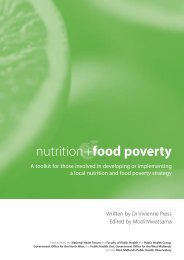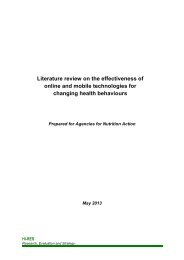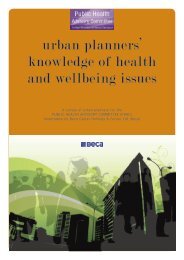enhancing food security and physical activity for maori, pacific and ...
enhancing food security and physical activity for maori, pacific and ...
enhancing food security and physical activity for maori, pacific and ...
- No tags were found...
You also want an ePaper? Increase the reach of your titles
YUMPU automatically turns print PDFs into web optimized ePapers that Google loves.
Enhancing Food Security <strong>and</strong> Physical Activity <strong>for</strong> Māori, Pacific <strong>and</strong> Low-income Peoplesin<strong>for</strong>m further debate on the merits of such a scheme. A fruit provision scheme doesnot challenge the established patterns of responsibility <strong>for</strong> children’s diets in the sameway a breakfast or lunch programme does, as it is designed to supplement, notreplace. The cost of a fruit provision scheme will also be less than breakfast or lunchprovision. It is possible, however, that a fruit provision scheme will have less impacton household or child <strong>food</strong> in<strong>security</strong> than a breakfast or lunch provision scheme, <strong>for</strong>the reason that it is not replacing the requirement <strong>for</strong> households to purchase <strong>food</strong> <strong>for</strong>children to eat at school. For children who are hungry at school, a fruit in schoolsscheme is less likely to provide adequate energy to address hunger, compared withbreakfast or lunch programmes.School breakfast programmes also received some level of support from interviewparticipants. It is likely that the intervention logic of providing school breakfastprogrammes will be enhanced if consideration is given to a wide range of issues,rather than just <strong>food</strong> <strong>security</strong>. For example, several participants mentioned thedifficulty parents may face in managing breakfast provision <strong>and</strong> be<strong>for</strong>e-school care,with work commitments. Developing breakfast programmes that are as much aboutbe<strong>for</strong>e-school care as <strong>food</strong> provision may enhance the benefit calculations of suchschemes. Several participants cautioned against relying on teachers <strong>and</strong> existingschool staff <strong>for</strong> these programmes, suggesting that the quality of teaching may suffer ifteachers are asked to supervise students in be<strong>for</strong>e-school programmes.With the current economic crisis <strong>and</strong> the likely rising unemployment rate in NewZeal<strong>and</strong>, the role of schools in providing a safety net of <strong>food</strong> provision should beactively monitored. If the current ad hoc arrangements are coming under strain, thenit is likely that a more considered policy response is required. This could be thedevelopment of national level programmes, or increased support <strong>for</strong> local solutions. Inorder to develop evidence of successful school <strong>food</strong> programmes, <strong>and</strong> impacts onstudent health, education <strong>and</strong> <strong>food</strong> <strong>security</strong> outcomes, an active trial <strong>and</strong> evaluationprogramme should be implemented.RecommendationsMaintain existing funding <strong>for</strong> Fruit in Schools.The initial evaluation findings of the Fruit in Schools scheme show signs of positiveoutcomes <strong>for</strong> children in increasing fruit consumption. The scheme also appearslargely acceptable to schools <strong>and</strong> policymakers. For this reason it seems prudent toensure the existing coverage of Fruit in Schools across decile one <strong>and</strong> two schools ismaintained. This includes removing the requirement that schools identify fundingoptions <strong>for</strong> the scheme after three years of government funding. When furtherevaluation results are available a discussion should be held on whether Fruit inSchools should be exp<strong>and</strong>ed to more schools. Because a fruit in schools scheme islikely to have less impact on <strong>food</strong> <strong>security</strong> compared with a breakfast or lunch inschools programme, due to the energy provided, an active research programme ofbreakfast programmes is also recommended.Keep a watching brief on existing programmes.The evidence regarding the impact of school <strong>food</strong> programmes on child outcomeslooks likely to increase in the near future with several schemes being trialled in NewZeal<strong>and</strong> <strong>and</strong> internationally. An active programme of considering research <strong>and</strong>evaluation findings, <strong>and</strong> implications <strong>for</strong> policy in New Zeal<strong>and</strong>, should be developed.Funding evaluations of existing New Zeal<strong>and</strong> programmes, including those providedby charitable organisations, should be part of this approach.59
















